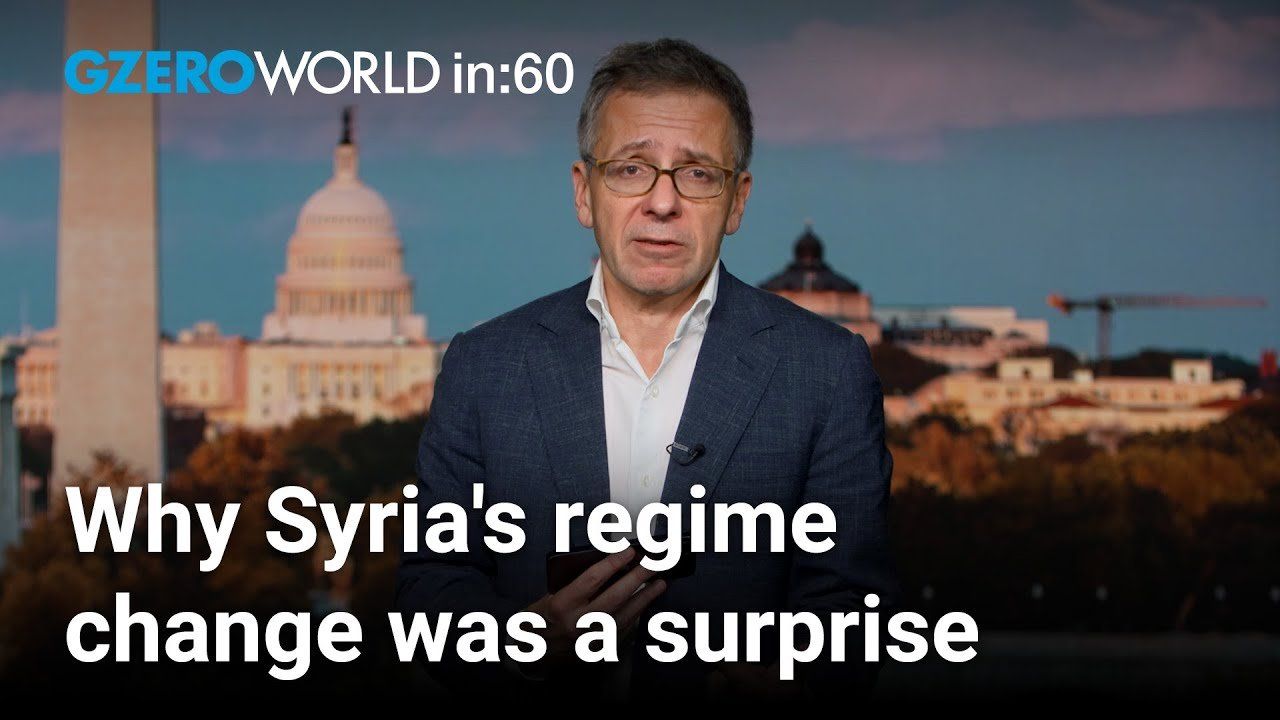Ian Bremmer shares his insights on global politics this week on World In :60.
Why did you originally think Assad would be able to resist being overthrown?
I am absolutely surprised at the sudden regime change after 50 years of the Assads being in charge. A couple of reasons for it. First is because despite HTS wanting to engage in strikes, the Turkish government, which has been supporting them militarily, had been saying, "No, no, no." And even when they supported them, it was a flashing yellow light. It was take local territory, let the Syrians have more control over their border region. It was not going after Assad. Also, because the Russians and the Iranians, though they were significantly stretched, were providing military support in the early days. So that's the reason I thought that they were likely to be able to resist, but the fact is that they imploded very, very quickly.
What led you to believe Yoon's martial law declaration would fail in South Korea?
Well, here felt a lot like January 6th in the United States, January 8th in Brazil. You had a besieged individual leader, in this case not about an election, but facing 20% approval rates and massive corruption scandals and all sorts of impeachments against members of his cabinet, just getting desperate and deciding to pull the trigger on emergency martial law illegally and without talking even to leadership of his own party. So it seemed pretty clear that there wasn't going to be support. The South Korean people, the judiciary, the parliament, and rank and file, and the military were clearly not going to be supportive. So I mean, I expected that to last very, very briefly, and it fell apart very quickly indeed. He should be out of power in short order. And I expect he's going to resign, by the way, as opposed to being impeached, but it could go either way.
What's another major geopolitical assessment you've made that played out differently than expected, and what does it reveal about the complexities of global politics?
One of the biggest ones is probably the role of technology in geopolitics. Back in the '90s, if you think about the coloured revolutions in the former Soviet republics, you think about the Arab Spring after that, technology was really the communications revolution. It was decentralizing. It gave individuals access to more information and power. It undermined authoritarian regimes, and it promoted democracy. And today, just 20 years, 25 years later, technology has completely changed geopolitically. It's much more top-down. It's much more centralizing. It's about the data revolution, the surveillance revolution. It increasingly empowers authoritarian states that know how to use it, and it undermines democracies. And that is maybe one of the biggest geopolitical changes that's happened in my political lifetime, certainly the biggest since the Soviet Union imploded back in 1989 to '91. And it just goes to show that no matter what you think about the world, if you're not constantly updating your views, you're going to be wrong at some point.
More For You
Walmart is investing $350 billion in US manufacturing. Over two-thirds of the products Walmart buys are made, grown, or assembled in America, like healthy dried fruit from The Ugly Co. The sustainable fruit is sourced directly from fourth-generation farmers in Farmersville, California, and delivered to your neighborhood Walmart shelves. Discover how Walmart's investment is supporting communities and fueling jobs across the nation.
Most Popular
President Trump’s second term has rapidly reshaped global politics, with the US wielding power more aggressively, targeting weaker countries and even allies, Stephen Walt explains on GZERO World.
Ian Bremmer breaks down a sudden and serious transatlantic crisis: President Trump’s insistence that the United States must have sovereignty over Greenland.
It’s been a year since President Trump returned to office. How has the world changed? Stephen Walt joins Ian Bremmer on GZERO World.
